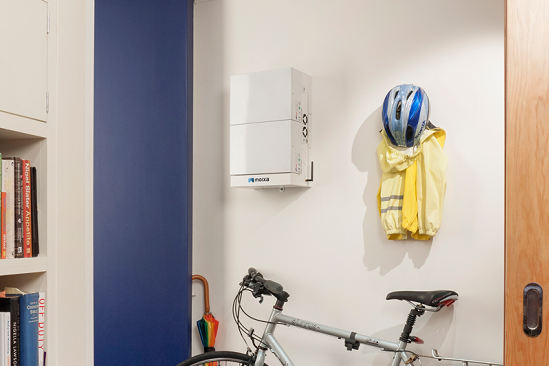Marking its entrance into the Japanese battery market, and gearing up to take advantage of the growing self-consumption opportunities in the country, London-based Moixa Energy Holdings Ltd has entered into a partnership with one of Japan’s largest trading houses.
Under the exclusive marketing deal, Itochu has said it will install Moixa's GridShare platform as a standard, on its products by this summer. Overall, Itochu also aims to sell more than 6,000 units of its “Smart star” home battery systems, which were developed in cooperation with the NF Corporation, by the end of this March.
AI technology
Under the GridShare aggregation platform, Moixa uses AI technology to trade excess power stored in smart batteries owned by partners in the GridShare scheme, with the National Grid. This helps to reduce the load on grids during peak demand, to create a flat grid.
The partners receive a share of the profits in return, the amount of which depends on whether the partner has a fixed income or profit share membership.
“The technology will save customers money by using artificial intelligence to optimise the performance of their battery based on their patterns of behaviour, the weather conditions and market prices,” said Moixa in a statement released.
Expansion
In addition to the distribution partnership, Itochu has said it will invest £5 million (around US$7.1 million) in Moixa to support international expansion.
This follows on from an investment of £500,000 by Japan’s Tokyo Electric Power Company Holdings (TEPCO) last April. Overall, the company raised around £3.5 million in 2017. It is specifically eyeing the European and U.S. markets for expansion.
“Moixa will now seek to expand its GridShare partnerships with Japanese utilities and electric vehicle manufacturers and to market services to electricity networks. It is also planning trials in the US and Europe this year,” read the statement.
In the U.K., the company has already installed nearly 1,000 battery systems. It further holds patents in the U.K., U.S. and Australia on distributed smart battery systems, and aggregating batteries for grid services.
Popular content
Self consumption
Both Moixa and Itochu forecast that installed energy storage systems in Japan will increase from the 125,000 in 2016, to over 500,000 in 2020. In the wake of expiring feed-in tariff systems, the market for self-consumption is expected to take off from 2019 onwards.
Speaking to pv magazine for the February print edition, Martin Tengler, Japan solar analyst at Bloomberg New Energy Finance said the opportunities they see in Japan are in self-consumption. “Because the price of electricity for residential and commercial customers is high in Japan, we expect more and more consumers to install rooftop solar panels,” he said.
RTS Corporation’s Izumi Kaizuka added that many companies are starting to prepare 2019 storage opportunities; FITS are almost lower than electricity prices; and the first batch of residential FIT recipients from 2009 will see their purchase period under the FIT end in 2019.
This is interesting, as going forward, they will either have to sell surplus power at a reduced price, or for free, as there is no more legal obligation to purchase the generated electricity; or move into self-consumption.
In its December newsletter, RTS wrote, “… self-consumption with combination of electric vehicle (EV) or storage battery and sales of surplus electricity to electricity retailers or aggregators through bilateral or free contract will be the options. For owners of residential PV systems, it is a good chance to transfer to a self-consumption model and also a new business opportunity for business entities.”
In addition to Itochu, Kyocera is also strongly focused on the opportunities self-consumption are presenting.
“In a market based on self-consumption, it is important to utilize electricity without waste and thus reduce the amount of power purchased from outside sources,” said Ichiro Ikeda, general manager of the company’s Solar Energy Marketing Division.
“By using AI- based (artificial intelligence) home energy management systems (HEMS), we offer a comprehensive solution that operates with other equipment such as photovoltaics, storage batteries, and EcoCute water heating systems to realize optimum energy use.”
In cooperation with the Energy Storage Europe exhibition, to be held in Düsseldorf, Germany, this March 13 to 15, pv magazine has prepared an Energy Storage special publication. It will be distributed along with the February edition of pv magazine, and at the exhibition.
This content is protected by copyright and may not be reused. If you want to cooperate with us and would like to reuse some of our content, please contact: editors@pv-magazine.com.



By submitting this form you agree to pv magazine using your data for the purposes of publishing your comment.
Your personal data will only be disclosed or otherwise transmitted to third parties for the purposes of spam filtering or if this is necessary for technical maintenance of the website. Any other transfer to third parties will not take place unless this is justified on the basis of applicable data protection regulations or if pv magazine is legally obliged to do so.
You may revoke this consent at any time with effect for the future, in which case your personal data will be deleted immediately. Otherwise, your data will be deleted if pv magazine has processed your request or the purpose of data storage is fulfilled.
Further information on data privacy can be found in our Data Protection Policy.